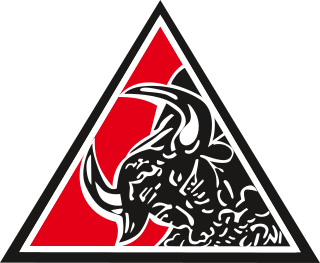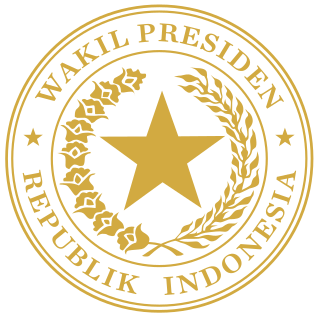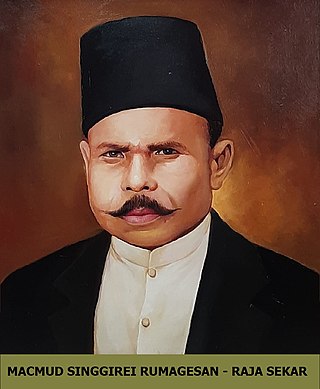
Sukarno was an Indonesian statesman, orator, revolutionary, and nationalist who was the first president of Indonesia, serving from 1945 to 1967.

Adam Malik Batubara was an Indonesian politician, diplomat, and journalist, who served as the third vice president of Indonesia from 1978 until 1983, under President Suharto. Previously, he served in a number of diplomatic and governmental positions, including Speaker of the People's Consultative Assembly from 1977 to 1978, Speaker of the People's Representative Council from 1977 to 1978, Foreign Minister of Indonesia from 1966 until 1977, and president of the United Nations General Assembly from 1971 until 1972.

The term Government of the Republic of Indonesia can have a number of different meanings. At its widest, it can refer collectively to the three traditional branches of government – the executive branch, legislative branch and judicial branch. The term is also used colloquially to mean the executive and legislature together, as these are the branches of government responsible for day-to-day governance of the nation and lawmaking. At its narrowest, the term is used to refer to the executive branch in the form of the President of Indonesia, as assisted by the Vice President and the Cabinet, as this is the branch of government responsible for day-to-day governance.

The Indonesian National Party was the name used by several nationalist political parties in Indonesia from 1927 until 1973. The first PNI was established by future President Sukarno. After independence, the new PNI supplied a number of prime ministers, and participated in the majority of cabinets in the 1950s and 1960s. The party was fused into the Indonesian Democratic Party in 1973. In the years following the reforms of the late 1990s, a number of parties claiming to be the continuation of previous PNIs stood in elections, but gained only a handful of seats.

Indonesia's Legislation on Chinese Indonesians were conducted through a series of constitutional laws and directives enacted by the Government of Indonesia to enforce cultural assimilation of ethnic Chinese in Indonesia with the wider Indonesian society. The legislations mostly regulated individual naming conventions and business statutes.

Guided Democracy, also called the Old Order, was the political system in place in Indonesia from 1959 until the New Order began in 1966. This period followed the dissolution of the liberal democracy period in Indonesia by President Sukarno, who centralized control in the name of political stability. He claimed to have based the system on the traditional village system of discussion and consensus, which occurred under the guidance of village elders. On the national level, however, this meant centralized rule under Sukarno: martial law, a massive reduction in civil liberties and democratic norms, and the Republic of Indonesia Armed Forces and Communist Party of Indonesia acting as major power blocs.

The Constitutional Assembly was a body elected in 1955 to draw up a permanent constitution for the Republic of Indonesia. It sat between 10 November 1956 and 2 July 1959. It was dissolved by then President Sukarno in a decree issued on 5 July 1959 which reimposed the 1945 Constitution.

The president of the Republic of Indonesia is the head of state and head of government of the Republic of Indonesia. The president is the leader of the executive branch of the Indonesian government and the supreme commander of the Indonesian National Armed Forces and the Indonesian National Police. Since 2004, the president and vice president have been directly elected to a five-year term, once renewable, allowing for a maximum of ten years in office. The current president is Prabowo Subianto, who assumed office on 20 October 2024.

The vice president of the Republic of Indonesia is second-highest officer in the executive branch of the Indonesian government, after the president, and ranks first in the presidential line of succession. Since 2004, the president and vice president are directly elected to a five-year term.

The Presidential Decree of 5 July 1959 was issued by President Sukarno in the face of the inability of the Constitutional Assembly of Indonesia to achieve the two-thirds majority to reimpose the 1945 Constitution. It was army chief of staff Abdul Haris Nasution who concluded that this would be the only way to bring about the reintroduction of a constitution that paved the way for the military to play a greater role in the running of the state, ushering in the period known as the "guided democracy" (1959–1966).

The Liberal Democracy period in Indonesia, also known as the Era of Parliamentary Democracy, was a period in Indonesian political history, when the country was under a liberal democratic system. During this period, Indonesia held its first and only free and fair legislative election until 1999, but also saw continual political instability. The period began on 17 August 1950 following the dissolution of the federal United States of Indonesia, less than a year after its formation, and ended with the imposition of martial law and President Sukarno's decree, which resulted in the introduction of Guided Democracy on 5 July 1959.

The National People's Party, initially founded as the Indonesian National Party–Independent, was a political party in Indonesia. It was founded on 23 July 1950 after a split within the Indonesian National Party (PNI). The divisions with the PNI had appeared at the party congress in May the same year, when Sidik Djojosukarto's followers had emerged victorious. Djody Gondokusumo was the chairman of the party.
National Hero of Indonesia is the highest-level title awarded in Indonesia. It is posthumously given by the Government of Indonesia for actions which are deemed to be heroic, defined as "actual deeds which can be remembered and exemplified for all time by other citizens" or "extraordinary service furthering the interests of the state and people". The Ministry of Social Affairs gives seven criteria which an individual must fulfill, as follows:
- Have been an Indonesian citizen who is deceased and, during his or her lifetime, led an armed struggle or produced a concept or product useful to the state;
- Have continued the struggle throughout his or her life and performed above and beyond the call of duty;
- Have had a wide-reaching impact through his or her actions;
- Have shown a high degree of nationalism;
- Have been of good moral standing and respectable character;
- Never surrendered to his or her enemies; and
- Never committed an act which taints his or her legacy.

The Chief of the Indonesian National Police, commonly known as the National Police Chief, is the official who heads the Indonesian National Police (Polri).

The Pancasila Ideology Development Agency is a non-ministerial government agency formed by the Indonesian government in 2018 with Presidential Decree No.7/2018. The agency was tasked with the main task of preserving Pancasila, the state ideology, and its ideological development and implementation. It is the revitalisation of Presidential Unit of Pancasila Ideology Development formed in 2017.
The People's Consultative Assembly, the bicameral legislature of Indonesia, passed a series of resolutions of the People's Consultative Assembly or TAP MPR throughout the 1960s, to the very last issued in 2003.

Machmud Singgirei Rumagesan was a king of Sekar and pro-integration activist from West Papua. He founded the movement Gerakan Tjendrawasih Revolusioner Irian Barat (GTRIB) in 1953, and became the member of Supreme Advisory Council in 1959. On 10 November 2020, Singgirei Rumagesan was posthumously declared a National Hero of Indonesia for his lifelong efforts to unite West Irian with Indonesia.
Nasakom, which stands for nationalism, religion and communism, was a political concept coined by President Sukarno. This concept prevailed in Indonesia from 1959 during the Guided Democracy Era until the New Order, in 1966. Sukarno's idea of Nasakom was an attempt to unify various political ideologies. Nasakom attempted to unite the nationalist, religious, and communist groups that at that time had the most power in Indonesian politics.
Argus Sanyudy is an Indonesian professional basketball player for the RANS Simba Bogor of the Indonesian Basketball League (IBL).













